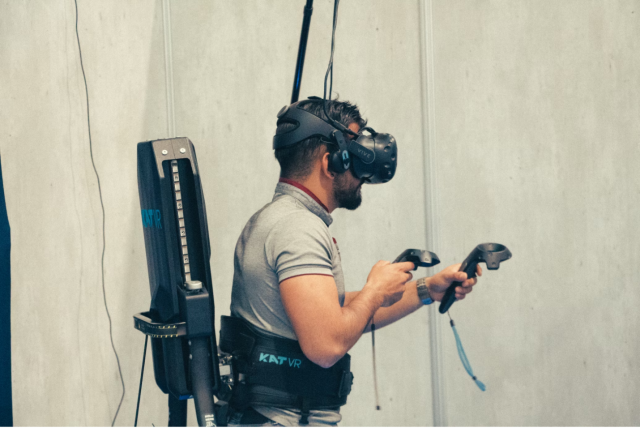Source: Unsplash
With the boom of online games and mobile apps, the gaming industry is now bigger than ever. Not only are there more people who play online but there are more hardcore gamers who are eager to spend more money on their hobby.
By the end of 2023, the revenue projections for this industry are exceeding 220 billion dollars. It’s pretty evident that we all love to play, and that games provide a unique form of entertainment. It’s a virtual environment where you can compete, collaborate, learn, and overcome challenges. So, let’s discuss how you can use gaming to run a business.
Gamification: A Business Strategy
Games usually teach players new things and give them an environment or a problem where those skills come in handy. They also reward their progression and problem-solving capabilities. This is something companies can do to improve staff training, and to improve customer loyalty. The idea of gamification is to add video game elements to a non-video game environment.
So, when you are designing learning courses for new recruits take this into consideration. How do you deliver the knowledge and how to create a scenario where it can be applied? For customers, you can always create scoring systems and loyalty tears as incentives. As they level up they can unlock different perks:
- Free shipping
- Discounts
- Gifts
- Ability to reserve items before they run out of stock
The points don’t need to be unlocked only through purchases. You can incentivize them to share your content on other sites, or even do affiliate marketing or drop shipping.
Gambling: The Spectacular Rise
Online gambling is another fast-growing entertainment industry. Even industry-adjacent businesses that review casinos and share their insights with gamblers are incredibly popular. One of the best reviewers for the Scandinavian market is ToppCasinoNorge and players use them as a resource for trustworthy casino sites, top bonuses, etc. Since the market is really competitive, operators want their names to be on the review sites and for players to read about their sites.
The same principle can be applied to any other business. Find sites that review products or services in your niche, and ask them to evaluate your business. This also means that people like the idea of getting more value for their money by the sheer stroke of luck. So, you can add lotteries or luck-based games as user incentives.
Players can get scratch cards with high-value purchases, and win additional prizes. It’s a great way to boost sales and use low-performing products that are taking up space in your storage. If some of your stock can’t generate value on its own use it as a gift for luck-based incentives.
Virtual Reality (VR) and Augmented Reality (AR) in Business
This isn’t exactly a new concept when we think about it. Training pilots and astronauts was always done in a simulated environment. But recently, more businesses have been leveraging VR and AR tech.
- Store owners create a virtual representation of their shop
- Real estate companies can have virtual house tours
- Tourism businesses can also have a VR presentation for destinations and accommodation.
It’s a more immersive form of marketing that gives buyers a better idea of what to expect. AR apps are another way to help shoppers and make the whole shopping experience more personalized and engaging. You can make an AR app shoppers can use. Scanning the product with your app can tell them if you have their size in stock, or if it’s available in their favourite colour.
Serious Games: Training and Skill Development
 Source: Unsplash
Source: Unsplash
Serious games are used in healthcare, education, and of course employee training. The idea is that participants also need to take them seriously and try to excel. You create a learning protocol and simulate the environment where the skills need to be implemented.
Role playing for example is a great way for your sales team to practic their sales pitch and communication. However, you would have to change the scenarios and use different user personas as potential shoppers. This can prepare them for different situations, teach them how to handle pushback, or even teach them when to give up.
The Gaming Community and Crowdsourcing
It’s also possible to get people to help you with certain tasks, for free. But you need to be clever enough to turn it into a game. This approach is called gamified crowdsourcing and it has helped businesses acquire useful data, find potential team members, or make unique scientific discoveries.
- Tomnod – A digital initiative where participants view satellite images of the aftermath of disasters. They try to pinpoint objects or locations that are worth investigating, plane crash sites or raft wreckage. These leads are evaluated and if they look promising the rescue team will investigate.
- Foldit – Computers aren’t as good at spatial pattern recognition as we think. So, they can’t help in certain areas. For example, scientists are trying to figure out all the different combinations of how proteins can fold, so that they can identify and counter viruses more effectively. To that end a protein folding simulator Foldit was created. Here gamers compete to create the most stable model of a protein that is folded.
Google has also used this method of gamified data gathering to create accurate labels for images and improve the Google image search.
Conclusion
As you can see games can be used in a variety of different scenarios. Employee training, promoting customer loyalty, creating exciting incentives, and even gathering valuable inputs. Entrepreneurs should really think hard about the possible ways to gamify their workspace. After all, it can lead to many positive outcomes.






